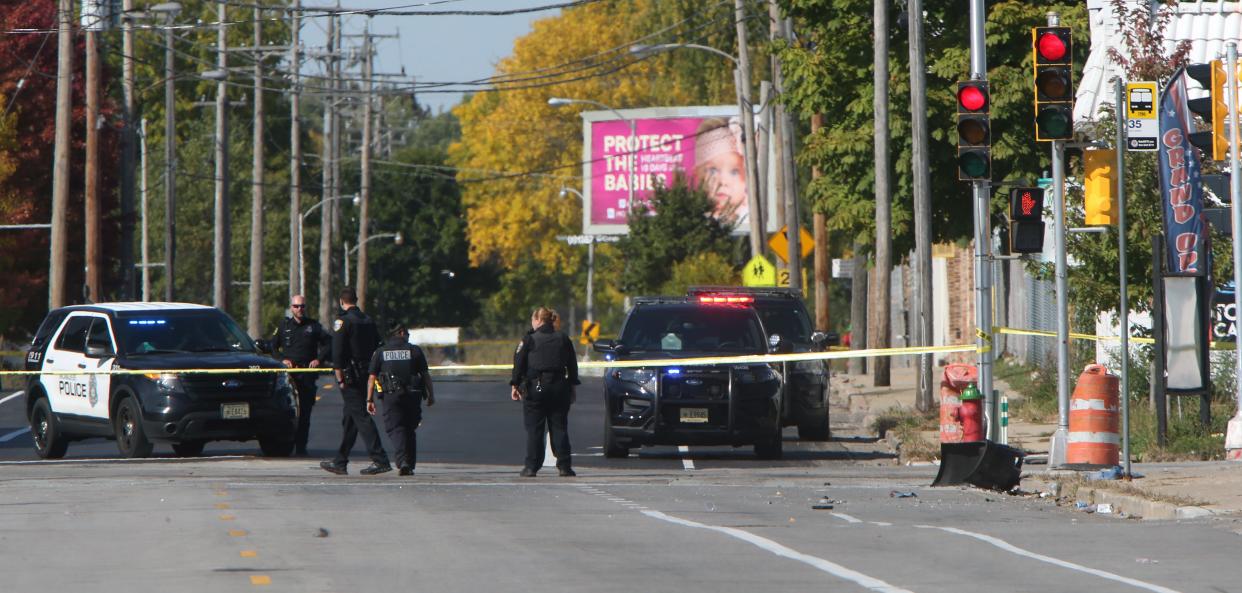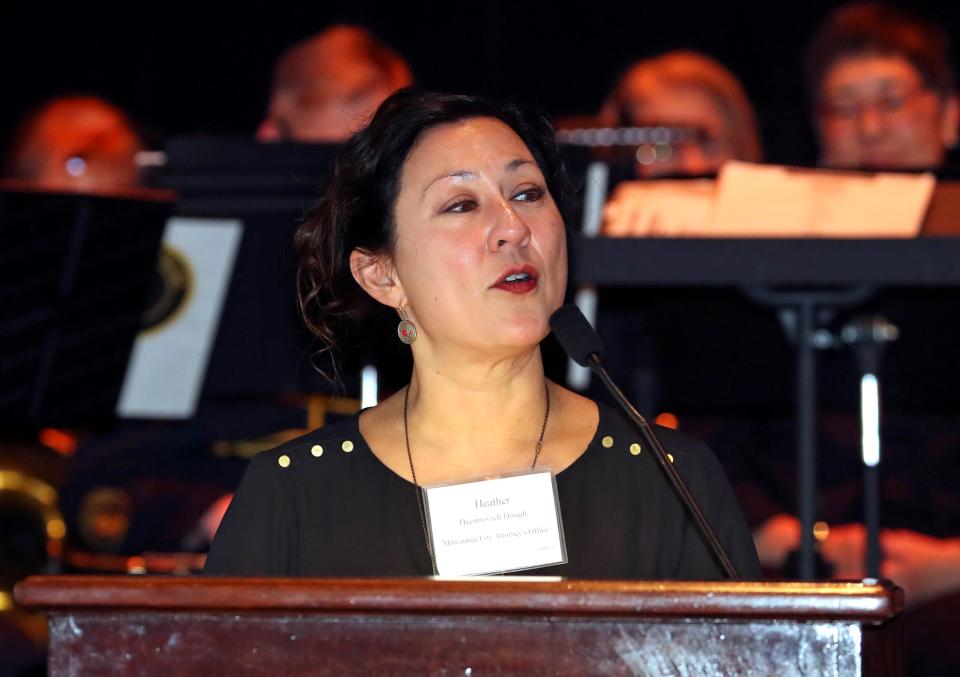Milwaukee police have made slow progress to reform stop-and-frisk practices. Here's why.

More than halfway through a court-ordered reform process, Milwaukee police are still disproportionately searching people of color in traffic and pedestrian stops and too often doing so without justification, new reports say.
Black residents were 18 times more likely to be subjected to a frisk and 4.8 times more likely to be pulled over than white people last year, according to two monitoring reports authored by the Boston-based Crime and Justice Institute released this fall.
Hispanic and Latino residents were 2.4 times more likely than white people to be frisked after encountering police in a traffic stop, informal street interview or another kind of encounter. And even accounting for differing crime rates, Milwaukee officers conducted frisks more often in Black, Hispanic and Latino neighborhoods than in white neighborhoods, the reports found.
The results are discouraging for activists who sought to reform the department's stop-and-frisk practices. Fred Royal, a vice president of Milwaukee's NAACP branch who works closely with the Police Department, said he did not expect a major cultural change to occur in four years but was still disappointed with the progress.
"I can’t understand how they cannot do the constitutional policing that they say they’ve been so committed to doing, which would justify those stops and frisks," he said.
Police and other city officials maintain the consent decree has led to notable improvements.
In a joint statement from Mayor Cavalier Johnson’s office, the Police Department and the Fire and Police Commission, the city said it is investing more time to determine what specifically is driving the disparities and is requiring more officer training on identifying biases.
“The city is resolute that constitutional policing occurs in each and every police interaction,” the statement said. “Mayor Cavalier Johnson is committed to assisting the FPC and MPD with the appropriate resources to attain the goals of the settlement agreement.”
The reform process, known as a consent decree, stipulates that Milwaukee police must meet certain benchmarks for at least five years. Four years into the agreement, the state's largest police agency has not met all of those requirements for a single year.
Lawsuit aimed to end racial disparities in police stops and searches
In 2018, the city reached a settlement agreement with the American Civil Liberties Union of Wisconsin, which said tens of thousands of Black and Latino residents had been stopped by police without reasonable suspicion of criminal activity.
The goal of the $3.4 million settlement was to end racial disparities in stops and to force officers to document the reasonable suspicion behind those stops, and any ensuing searches, at least 85% of the time.
The racial disparities in civilian stops made by police have continued into 2022 in Milwaukee, but officers have made notable progress in documenting the justification for their stops and frisks.
The Police Department has met the benchmark of documenting the reasoning behind at least 85% of traffic stops in each of the last there years.
It has never hit that mark with frisks. But in the latest batch of data available, from January through June of 2022, police documented the justification behind 70% of frisks — its highest score to date and an improvement of almost 24 percentage points from the six months prior.
Still, the department's "practice of making unconstitutional and racially biased stops-and-frisks remains pervasive,” said Emma Shakeshaft, an attorney with the ACLU of Wisconsin, in a statement.
The recent reports once again commend the department’s top administrators for laying down a solid foundation for constitutional policing but say the Patrol Bureau, which oversees officers on the street, has struggled to comply with the court mandate.
Two obstacles to reform are cited by police officials and in the report: A grievance filed by the union representing police supervisors and the challenge of creating cultural change within a department of more than a thousand officers.
Patrol Bureau, frontline officers and their supervisors, struggle to meet court-ordered goals
The recent reports focus on the Patrol Bureau, suggesting the unit as a whole has not assumed as much responsibility for complying with the settlement as other areas of the Police Department.
The bureau is large, including hundreds of sworn personnel working across the city, making compliance "a very heavy lift," said Heather Hough, the department's risk manager.

“It isn’t easy to get over a thousand people rowing in the same direction,” she said. “We’re getting there.”
Another challenge identified in the report is a grievance filed by the union representing Milwaukee police supervisors over how supervisors are disciplined when it comes to report completion, timeliness, documentation of failures and general supervisory failures of the patrol officers.
The grievance has gone to arbitration, and until it is resolved, the city “seems unable to hold those supervisors accountable in a way that the Settlement Agreement imagines,” the reports said.
The Milwaukee Police Supervisors Organization, the union behind the grievance, did not return multiple requests for an interview.
Nick DeSiato, the chief of staff for the Milwaukee Police Department, said he was confident the department could manage the situation, characterizing the grievance as more of a "speedbump" than a "rockblock."
Slow progress on consent decrees is expected, experts say
The findings that officers are still searching people more often in Black, Hispanic and Latino neighborhoods, even accounting for differences in local crime rates, has prompted city officials to dig deeper.
The new analysis underway will provide “a more nuanced assessment” of police encounters in smaller geographic areas, according to a statement from the city. The goal is to pinpoint what systemic police actions or socioeconomic factors might be affecting the disparities.
“If the analysis can identify anything overall about what those factors are, or for MPD to own some of it and take a deeper dive into what our operations are, we’re committing to finding that because constitutional policing is at the forefront of everything we do,” Hough said.
This fall, the department also mandated a 90-minute supplemental training about unconscious bias administered by Milwaukee Municipal Court Judge Derek Mosley, who will be moving to Marquette Law School in the new year. Hough said that was in addition to routine, annual training on the subject.
None of Milwaukee's challenges or its pace of progress was surprising to Delores Jones-Brown, a criminal justice professor emeritus at the City University of New York.
Officers often resist outsiders, such as a monitoring team, making changes because "the frontline officers feel like only they are in a position to be able to say how best to behave on the streets,” Jones-Brown said.
Robust training is critical, she said.
In general, police historically have been trained to prioritize their safety, she said. Police units encouraged to be aggressive with stops and searches are the same units patrolling in poor, urban communities where residents are predominantly people of color, she added.
Overcoming that is “going to take a lot more than an agreement between an agency that’s outside the department and managers inside the department," she said.
“It really will take a lot of extensive training that goes beyond the anywhere from four to eight hours that most agencies are willing to spend on implicit bias training.”
Contact Elliot Hughes at elliot.hughes@jrn.com or 414-704-8958. Follow him on Twitter @elliothughes12.
This article originally appeared on Milwaukee Journal Sentinel: Milwaukee police still have racial disparities in stops, frisks

